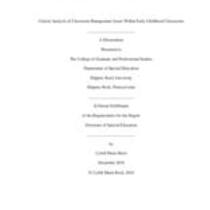- Title
- College Catalog
- Year Created
- 1963
- Abstract
-
Course catalogs were published in print from 1889 until the 2003-2004 academic year. The following academic year Slippery Rock University switched to an all online course catalog. At times there were separate undergraduate and graduate catalogs in print as well as ca...
Show moreCourse catalogs were published in print from 1889 until the 2003-2004 academic year. The following academic year Slippery Rock University switched to an all online course catalog. At times there were separate undergraduate and graduate catalogs in print as well as catalogs for summer sessions. Catalogs contained course and degree descriptions, curriculum outlines, an academic year calendar, fees, history of the institution, scholarship requirements, information on individual Board of Trustee Members, administrators and faculty, and other useful information for students.
Show less - Sub-title
- Catalog 1963-1965 excerpt
- Title
- College Catalog
- Year Created
- 1970
- Abstract
-
Course catalogs were published in print from 1889 until the 2003-2004 academic year. The following academic year Slippery Rock University switched to an all online course catalog. At times there were separate undergraduate and graduate catalogs in print as well as ca...
Show moreCourse catalogs were published in print from 1889 until the 2003-2004 academic year. The following academic year Slippery Rock University switched to an all online course catalog. At times there were separate undergraduate and graduate catalogs in print as well as catalogs for summer sessions. Catalogs contained course and degree descriptions, curriculum outlines, an academic year calendar, fees, history of the institution, scholarship requirements, information on individual Board of Trustee Members, administrators and faculty, and other useful information for students.
Show less - Sub-title
- Catalog 1970-1971 excerpt
- Title
- College Catalog
- Year Created
- 1972
- Abstract
-
Course catalogs were published in print from 1889 until the 2003-2004 academic year. The following academic year Slippery Rock University switched to an all online course catalog. At times there were separate undergraduate and graduate catalogs in print as well as ca...
Show moreCourse catalogs were published in print from 1889 until the 2003-2004 academic year. The following academic year Slippery Rock University switched to an all online course catalog. At times there were separate undergraduate and graduate catalogs in print as well as catalogs for summer sessions. Catalogs contained course and degree descriptions, curriculum outlines, an academic year calendar, fees, history of the institution, scholarship requirements, information on individual Board of Trustee Members, administrators and faculty, and other useful information for students.
Show less - Sub-title
- 1972-1973 Excerpt
- Title
- College Catalog
- Year Created
- 1974
- Abstract
-
Course catalogs were published in print from 1889 until the 2003-2004 academic year. The following academic year Slippery Rock University switched to an all online course catalog. At times there were separate undergraduate and graduate catalogs in print as well as ca...
Show moreCourse catalogs were published in print from 1889 until the 2003-2004 academic year. The following academic year Slippery Rock University switched to an all online course catalog. At times there were separate undergraduate and graduate catalogs in print as well as catalogs for summer sessions. Catalogs contained course and degree descriptions, curriculum outlines, an academic year calendar, fees, history of the institution, scholarship requirements, information on individual Board of Trustee Members, administrators and faculty, and other useful information for students.
Show less - Sub-title
- Catalog 1974-1976
- Title
- College Catalog
- Year Created
- 1984
- Abstract
-
Course catalogs were published in print from 1889 until the 2003-2004 academic year. The following academic year Slippery Rock University switched to an all online course catalog. At times there were separate undergraduate and graduate catalogs in print as well as ca...
Show moreCourse catalogs were published in print from 1889 until the 2003-2004 academic year. The following academic year Slippery Rock University switched to an all online course catalog. At times there were separate undergraduate and graduate catalogs in print as well as catalogs for summer sessions. Catalogs contained course and degree descriptions, curriculum outlines, an academic year calendar, fees, history of the institution, scholarship requirements, information on individual Board of Trustee Members, administrators and faculty, and other useful information for students.
Show less - Sub-title
- Undergraduate Catalog 1984-1986
- Title
- College Catalog
- Year Created
- 1989
- Abstract
-
Course catalogs were published in print from 1889 until the 2003-2004 academic year. The following academic year Slippery Rock University switched to an all online course catalog. At times there were separate undergraduate and graduate catalogs in print as well as ca...
Show moreCourse catalogs were published in print from 1889 until the 2003-2004 academic year. The following academic year Slippery Rock University switched to an all online course catalog. At times there were separate undergraduate and graduate catalogs in print as well as catalogs for summer sessions. Catalogs contained course and degree descriptions, curriculum outlines, an academic year calendar, fees, history of the institution, scholarship requirements, information on individual Board of Trustee Members, administrators and faculty, and other useful information for students.
Show less - Sub-title
- Undergraduate Catalog 1989-1991 excerpt
- Title
- College Catalog
- Year Created
- 2000
- Abstract
-
Course catalogs were published in print from 1889 until the 2003-2004 academic year. The following academic year Slippery Rock University switched to an all online course catalog. At times there were separate undergraduate and graduate catalogs in print as well as ca...
Show moreCourse catalogs were published in print from 1889 until the 2003-2004 academic year. The following academic year Slippery Rock University switched to an all online course catalog. At times there were separate undergraduate and graduate catalogs in print as well as catalogs for summer sessions. Catalogs contained course and degree descriptions, curriculum outlines, an academic year calendar, fees, history of the institution, scholarship requirements, information on individual Board of Trustee Members, administrators and faculty, and other useful information for students.
Show less - Sub-title
- Undergraduate Catalog 2000-2001
- Title
- College Catalog
- Year Created
- 2003
- Abstract
-
Course catalogs were published in print from 1889 until the 2003-2004 academic year. The following academic year Slippery Rock University switched to an all online course catalog. At times there were separate undergraduate and graduate catalogs in print as well as ca...
Show moreCourse catalogs were published in print from 1889 until the 2003-2004 academic year. The following academic year Slippery Rock University switched to an all online course catalog. At times there were separate undergraduate and graduate catalogs in print as well as catalogs for summer sessions. Catalogs contained course and degree descriptions, curriculum outlines, an academic year calendar, fees, history of the institution, scholarship requirements, information on individual Board of Trustee Members, administrators and faculty, and other useful information for students.
Show less - Sub-title
- Undergraduate Catalog 2003-2004
- Title
- College Catalogs
- Abstract
-
Course catalogs were published in print from 1889 until the 2003-2004 academic year. The following academic year Slippery Rock University switched to an all online course catalog. At times there were separate undergraduate and graduate catalogs in print as well as ca...
Show moreCourse catalogs were published in print from 1889 until the 2003-2004 academic year. The following academic year Slippery Rock University switched to an all online course catalog. At times there were separate undergraduate and graduate catalogs in print as well as catalogs for summer sessions. Catalogs contained course and degree descriptions, curriculum outlines, an academic year calendar, fees, history of the institution, scholarship requirements, information on individual Board of Trustee Members, administrators and faculty, and other useful information for students.
Show less
- Title
- A correlational study
- Abstract
-
The Kindergarten Readiness Assessment was administered to every kindergartener in Maryland with the purpose of identifying students for interventions and support. Title I schools received federal funding to close the achievement gap between socioeconomic groups. Give...
Show moreThe Kindergarten Readiness Assessment was administered to every kindergartener in Maryland with the purpose of identifying students for interventions and support. Title I schools received federal funding to close the achievement gap between socioeconomic groups. Given KRA data and additional funding, Title I schools are given additional support to close the achievement gaps. This study investigated if the scores correlate to the third-grade state assessment (Maryland Comprehensive Assessment Program) in ELA and Math when sorted by Title I and non-Title I schools. Descriptive statistics were conducted to determine skewness and kurtosis and then Pearson’s Correlation was conducted to determine correlation between scores. It was determined that there was a correlation between KRA scores in both MCAP-ELA/L and MCAP-M in both Title I and non-Title I schools, but it was not as strong in Title I schools as it was in non-Title I schools. It is recommended that future research investigates testing fidelity when teacher administer the KRA and MCAP assessments. Research should also review how Title I schools use funding in early childhood interventions, and if the funding is effective or efficiently used to close the achievement gap. If the purposes of KRA and Title I were effective, the achievement gap would be closing between Title I and non-Title I school.
Show less - Year Issued
- 2023
- Author
- Locke, Danelle
- Sub-title
- kindergarten readiness and third grade state assessment scores within Title 1 and non-Title 1 schools
- Title
- Creating a trauma informed school
- Abstract
-
The purpose of this study was to determine the impact of a social-emotional learning (SEL) resource in kindergarten through grade 4 classrooms on creating a trauma-sensitive school. One tenet of supporting a trauma-sensitive and informed school is the utilization of ...
Show moreThe purpose of this study was to determine the impact of a social-emotional learning (SEL) resource in kindergarten through grade 4 classrooms on creating a trauma-sensitive school. One tenet of supporting a trauma-sensitive and informed school is the utilization of a social-emotional resource. The resource entitled In Focus authored by Thomas McSheehy MSW, LSW was implemented in general education classrooms for 45 school days. Prior to the implementation of the resource, a qualitative survey was provided to participating teachers to determine previous knowledge of trauma-informed schools and social-emotional learning. This information would be further used to support professional development needs of educators in the participating district to support students that have been impacted by traumatic events. During the 45 days, weekly professional development meetings were conducted with the study group that focused on equipping educators with the necessary skills and knowledge to provide a trauma-sensitive environment. At the conclusion of the 45 day study, an electronic qualitative survey was provided to the participants to confirm or refute the success of the selected social-emotional resource, In Focus. iv The research questions examined during the study included: 1. Prior to this study what training or professional development did Kindergarten-Grade 4 teachers participate in related to trauma-informed schools? 2. After nine weeks of incorporating a daily social-emotional learning resource, what impact was evidenced in the classroom community? 3. After implementing a social-emotional learning resource, and attending the weekly professional development meetings, what specific skills, knowledge, and/or strategies do Kindergarten-Grade 4 teachers feel the most confident to implement in their classrooms? 4. After attending the weekly professional development meetings and evening professional development event, at what level will K-4 teachers feel prepared to deliver a social-emotional learning resource to students? This study contributes to the research in the area of supporting students that have experienced traumatic events and the teachers that support them. Further, it outlines the needs of the participating teachers in the district relating to past and future professional development opportunities around the topic of social-emotional learning and trauma-informed and sensitive schools. An electronic survey was conducted to gather feedback on the areas of the resource that participating teachers determined to be both successful and not helpful to their classroom community. Additionally, teachers provided a comparison of social-emotional competencies that they observed in their students as compared to prior observations to the resource implementation.
Show less - Year Issued
- 2022
- Author
- Doyle, Kristen
- Sub-title
- a study of the implementation of a social-emotional learning resource
- Title
- Critical analysis of classroom management issues within early childhood classrooms
- Year Issued
- 2018
- Abstract
-
Classroom management has been the topic of many research studies in the past (Anderson & Kinaid, 2005; Carter & Pool, 2012; Chu, 2015; Ersozlu & Cacyi, 2016; Evertson, 1989; Grining, et al., 2010; Ritz et al., 2014). The purpose of this study was to examine what earl...
Show moreClassroom management has been the topic of many research studies in the past (Anderson & Kinaid, 2005; Carter & Pool, 2012; Chu, 2015; Ersozlu & Cacyi, 2016; Evertson, 1989; Grining, et al., 2010; Ritz et al., 2014). The purpose of this study was to examine what early childhood teachers regarded as disruptive behaviors, what strategies were used to manage said behaviors, and the usefulness of using said strategies. All participants in this research were currently teaching in a Head Start or Pre-K classroom. To collect data for this study, a mixed method study was conducted. A quantitative survey was conducted to gather information on the types of classroom management strategies that were used and the frequency and usefulness of said strategy. To gather qualitative data for this study, four open-ended questions were asked at the beginning of the survey to gather more in-depth answers from teachers on classroom management. The participants interviewed for this study were certified teachers who were employed as early childhood teachers located in Western Pennsylvania. The interviews occurred during the 2017-2018 school year. Results from this study included five main findings. First, it was determined that disruptive behaviors vary between early childhood classrooms and that teachers would benefit from learning classroom management strategies that focus on managing a range of behaviors. Second, lack of knowledge in the time and consistency it takes to shape behaviors leads to teachers not committing to research-based classroom management techniques. Third, teachers have not had enough training in using research-based classroom management techniques for those techniques to be considered useful and effective in their classroom. Fourth, teachers need additional support within their classroom to better meet the needs of diverse learners. Finally, when specific research-based teaching strategies were used frequently, teachers found them to be very useful. Findings suggest that early childhood teachers would benefit and are in need of additional trainings in how to use research-based classroom management techniques to manage disruptive behaviors.
Show less - Author
- Reed, Cybill




















